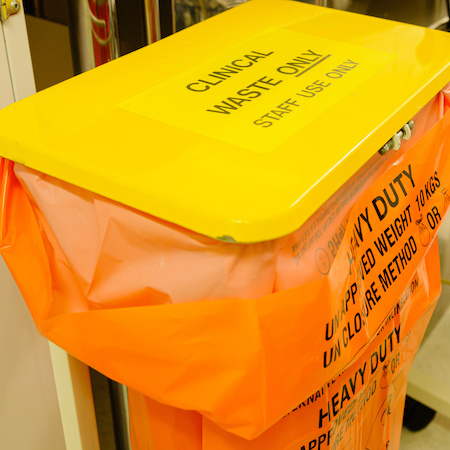NHS England has published a new clinical waste strategy, which sets out its ambition to transform the management of clinical waste by eliminating unnecessary waste, finding innovative ways to reuse, and ensure waste is processed in the most cost effective, efficient, and sustainable way.
NHS providers in England produce approximately 156,000 tonnes of clinical waste each year that is either sent to high temperature incineration (HTI) or for alternative treatment (AT), which is equivalent to over 400 loaded jumbo jets of waste. This has a significant environmental impact and is associated with high running costs and carbon emissions.
The strategy, when implemented, aims to reduce future waste volumes, helping to generate approximately £11 million revenue savings every year for the next 10 years. It will also lead to a 30% reduction in carbon emissions, helping to deliver the NHS’s ambition to be net zero in our estate by 2040 and minimise environmental harm for patients, staff, and the wider community.
The clinical waste strategy sets a bold direction of travel for reforming the management of clinical waste, including specific actions for NHS estates teams:
• Ensuring 100% of NHS providers, including primary care managing agents, have fully trained waste managers to ensure waste is managed effectively and appropriately. The NHS is supporting this by establishing the first ever professional qualification in NHS waste management this year.
• Improving waste segregation and compliance by aiming for a 20-20-60 waste split – 20% incineration (yellow bag) waste, 20% infectious (orange bag) and 60% offensive waste.
• Making the management of waste contracts a priority for NHS Trusts.
Enabling NHS ownership and control of its own processing assets, including making use of innovative technologies to treat infectious waste on-site.
• The NHS is one of the largest producers of waste in the country, and it is everyone’s responsibility to segregate and dispose of waste in a safe, efficient and sustainable manner. This is why, alongside the clinical waste strategy, NHS England has published two other documents to assist providers in meeting the strategy’s aims:
• The revised Health Technical Memorandum (HTM) 07-01: Safe and sustainable management of healthcare waste, which provides technical guidance and best practice for the safe management of healthcare waste and to ensure waste is segregated appropriately.
• A tool to support Trusts with their waste management decisions, improve waste segregation, and help to reduce waste related carbon emissions.
For more detail on this suite of new documents, please see our interview with Liam Hogg, Head of Net Zero Carbon Waste and Resources at NHS England in the March/April issue of Pulse. Digital version will be available @March 14.











